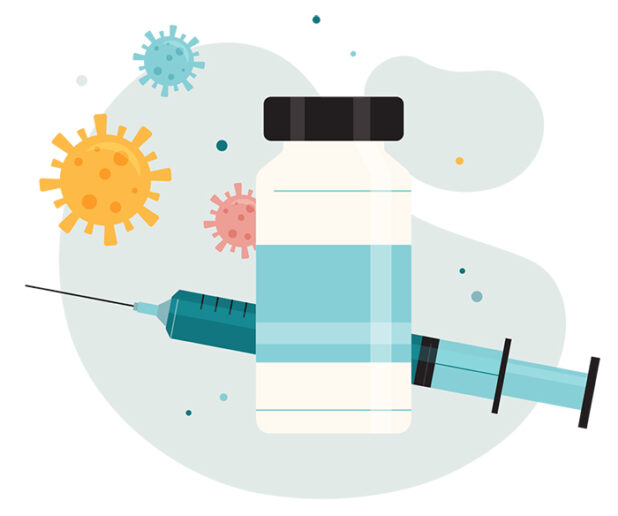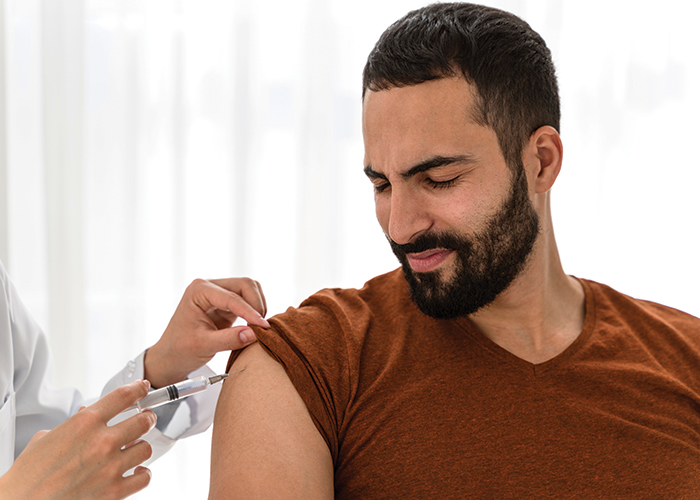In our fast-paced lives, getting sick is something no one has time for, yet it’s an unfortunate reality that can disrupt everything from work to personal plans. Thankfully, a flu shot or COVID vaccine takes just minutes to check off your to-do list, and they could save you from not only days of illness but also from potential complications that may arise. We spoke with Sam Englender, Physician Assistant at Hamilton Community Health Network’s Main Clinic, who sheds light on the crucial role that flu and COVID vaccines play in preventing serious illness, and how they can keep you healthy and resilient throughout this season and beyond.

Sam Englender, PA treats patients at the Hamilton Community Health Network Main Clinic on Saginaw St. in Flint. He collaborates closely with his patients to enhance their overall health and well-being, ensuring they receive the support and care they need. He is currently accepting new patients.
Protect Yourself
Having the flu or COVID is more than just an inconvenience; for many, it can have a significant personal and professional impact. People who come down with either infection often find themselves bedridden for days, leading to missed work, family obligations and social activities. For some, particularly those with underlying health conditions, the flu can lead to serious complications like pneumonia, hospitalizations and, in the worst cases, even death. The Center for Disease Control (CDC) estimated that between 34 and 75 million flu illnesses occurred in the U.S. during the 2023-2024 flu season, highlighting just how widespread and impactful the virus can be.
“Protecting yourself from the flu or COVID is an easy way to protect your overall health, you just need to get the vaccines,” Englender shared. “It takes only minutes and can easily be added to an appointment.” The vaccines not only help prevent personal illness but also reduce the likelihood of passing the virus on to others, especially those who are more vulnerable, such as young children, the elderly or immunocompromised individuals. Englender also pointed out that both the flu shot and COVID vaccines can be given together.

Build Your Immunity
Developing immunity takes time. “Our bodies need about two weeks to build up the immunity to any virus, including the flu and COVID virus,” he explained. “During this time, it’s important to take precautions, such as avoiding close contact with anyone who may be sick.” Englender says if you become sick, stay home. By allowing your body time to strengthen its defenses, you enhance your protection and reduce the risk of severe illness.
Know the Facts
There are many misunderstandings about vaccines in general, so Englender encourages his patients to come to him with any concerns. He emphasized, “Have an open conversation with your healthcare provider about vaccines. He or she can help you make an informed decision based on your health and what is best for you.”
The vaccines not only help prevent personal illness but also reduce the likelihood of passing the virus on to others, especially those who are more vulnerable, such as young children, the elderly or immunocompromised individuals.
Vaccines are vital for protecting our health, yet several myths often cloud their importance and efficacy. Misinformation has led to hesitancy and increased risk of illness for individuals and communities, alike. Englender encourages everyone to empower themselves with the facts to make informed decisions. Some key points he frequently discusses with his patients include vaccine safety, who should get vaccinated, and debunking the common myth that you cannot get the flu from the flu shot.

Vaccines are Safe
Englender assures us that both the flu shot and COVID vaccines are safe and effective. The CDC explains that vaccines undergo rigorous testing in clinical trials to ensure safety and efficacy, and ongoing monitoring continues once the vaccine is in use. One of the most questioned vaccines was the COVID vaccine when it was developed. Today, more than 13 billion COVID vaccine doses have been administered worldwide, with 82% of the U.S. population having received at least one dose.
Healthy People Need Vaccines
Even if you’re generally healthy, vaccination is crucial for preventing illness. Healthy individuals can still catch the flu or COVID and experience severe symptoms. More importantly, they can spread the virus to others who may be more vulnerable, such as the elderly, young children, or individuals with compromised immune systems. Vaccination helps protect both you and the people around you.

Flu Shots Cannot Cause the Flu
This is one of the most persistent myths about the flu shot. “I want to stress that you cannot get the flu from a flu shot. The flu vaccine contains either an inactivated virus or a small piece of the virus that cannot cause illness,” Englender assured us. Some people may experience mild side effects, such as soreness at the injection site or a low-grade fever, but these are signs that the body is building protection, not that someone has contracted the flu.
In closing, remember: Getting vaccinated doesn’t just protect you – you’re also helping to protect those around you, especially vulnerable populations like the elderly, young children and people with weakened immune systems. By taking just a few minutes out of your day to get a flu shot or COVID vaccine, you’re reducing your risk of developing a serious illness and increasing your likelihood of staying healthy. Stay proactive about your health this season, and make sure to check “vaccines” off your to-do list today!














